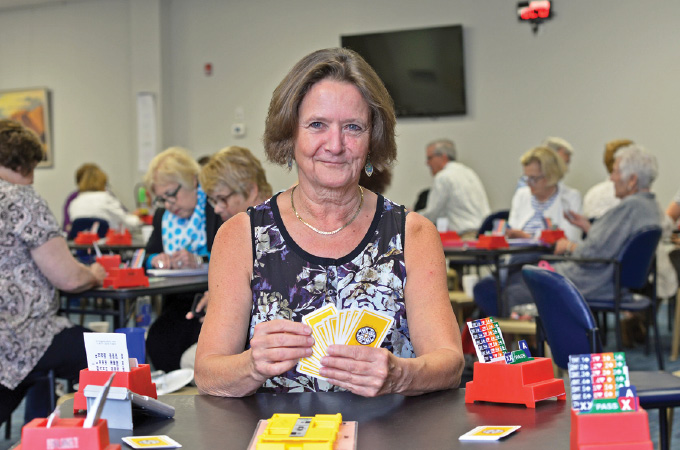If you ask local bridge expert Ann Lemp how the card game benefits those who play, she’ll tell you that it strengthens mental focus and encourages strategic thinking. But she also will explain how it improves people’s lives in much deeper ways.
Lemp plays duplicate bridge, a form of the game that is used in club and tournament circles. A retired attorney, she is the former president and a current board member of the nonprofit St. Louis Bridge Center in Olivette, which offers a variety of special events, competitions, seminars and classes.
The center opened about seven years ago and already is one of the largest of its kind in the nation. It aims to help people of all backgrounds enjoy the game’s many mental and social benefits, Lemp explains.“No matter what else is going on in your life, bridge is a great escape,” she says. “When you’re spending three and a half hours at the card table, you have to focus completely on what you and your opponents are doing. When I first began playing, I was having some difficulties in my personal life, and the game provided a much-needed diversion.”
She says it’s a godsend for people who have lost a family member or suffered other setbacks that might isolate them. “The game encourages you to get out of the house, be with other people, make friends, follow rules and sharpen your thought processes,” she explains. “The bridge center is one big community of people who look out for each other. No one cares where you live or how much money you have; you’re accepted for who you are. It’s a very socially healthy experience.”
Bridge also is a kind of universal language that unites people of different cultures, according to Lemp. “You can go almost anywhere in the world and find a club to sit in with,” she says. “It’s like an instant community of friends.” The game is based on a set of 15 terms—the numbers 1 through 7, the four suits (club, diamond, spade and heart), pass, double, redouble and notrump—so it’s easy to grasp the logic of it wherever you play, she notes. Lemp says she first became involved with bridge in an offhand way, but once she really immersed herself, she quickly became a regular. “I had played some when I was in school and went to a novice competition with a friend in 2011,” she recalls. “We finished playing and went to get some wine. Then, they announced that our section had come in first. We were hooked.”
She has some advice for those who think bridge sounds too strict or complex to be enjoyable. “You do have to concentrate and pay attention to the rules, but you certainly don’t have to be a math expert or the smartest person in the room,” she says. “Once you start playing, you get into the competitive spirit, and that helps you focus. The experience snowballs, and it really is enjoyable for people of different ages and skill levels. We have members who have been playing for years and others who are just learning. Right now, there is a 12-year-old member who is starting a club at her junior high school.”
Lemp says the atmosphere at the St. Louis Bridge Center is warm and welcoming, it’s open daily, game fees are reasonable, and you don’t need a partner to play there. “If you don’t have one, we’ll find you one,” she notes. “We make the experience very user-friendly. I’ve found that no one who learns this game ever regrets it.”
Photo: Bill Barrett
